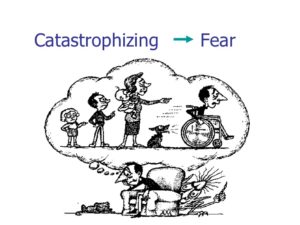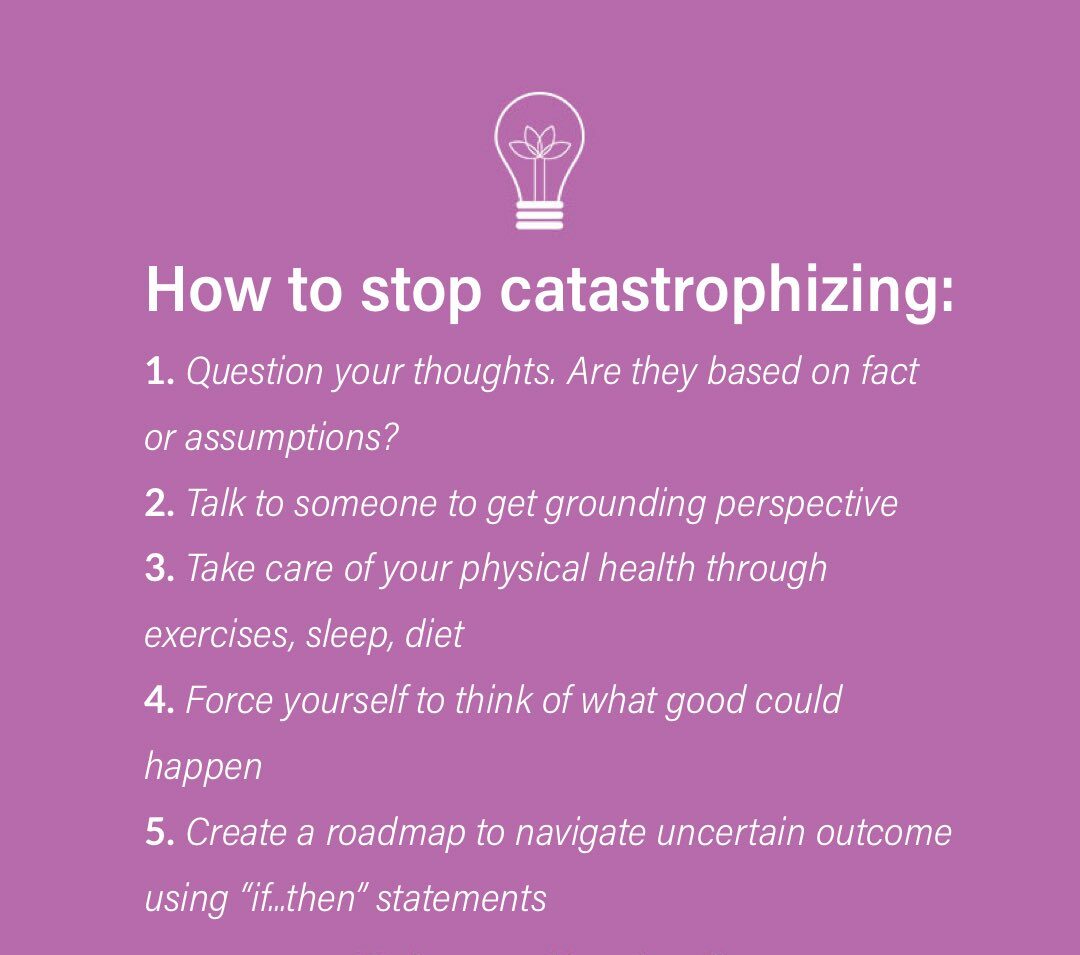Do you ever feel like the world is ending? That everything is going wrong and that things will never get better? If so, you may be experiencing catastrophizing. In this blog post, we will discuss all aspects of it including types, tips, therapies, and resources. Furthermore, we will hear from experts in the field to get their insights on how best to cope with this condition.
Contents
Understanding Catastrophizing
Catastrophizing is a mental health condition that causes individuals to see the world negatively and catastrophically. Furthermore, individuals who catastrophize often feel like they are in danger. Or that something bad is going to happen. They may also feel like they are not able to cope with what is happening in their lives. Thus, it can lead to anxiety, depression, and other mental health conditions.
History And Development
The term catastrophizing was first introduced in the 1970s by Dr. Paul Salkovskis. At the time, he was working on a study looking at how people with panic disorder viewed their symptoms. Subsequently, he found that many of these individuals would catastrophize their symptoms. Or see them as indicative of something much worse.
Types of Catastrophizing
There are two types of catastrophizing: primary and secondary.
- Primary catastrophizing is when an individual believes that the world is ending or that something bad is going to happen. This type of catastrophizing can lead to anxiety and depression.
- Secondary catastrophizing is when an individual believes that they are not able to cope with what is happening in their lives. This type of catastrophizing can lead to anxiety, depression, and other mental health conditions.
Symptoms of Catastrophizing
The symptoms of catastrophizing vary from person to person. However, some common symptoms include:
- Fear
- Anxiety
- Depression
- Hopelessness
- Pessimism
Causes And Risk Factors
There is no one cause for it. It is thought to be caused by a combination of genetic, biological, and environmental factors. However, some of the most common causes include:
- Trauma
- Stress
- Anxiety
- Depression
There are several risk factors for catastrophizing. However, some of the most common ones include:
- Stress
- Trauma
- Low self-esteem
- Negative thinking patterns
- Having a mental health condition like anxiety or depression
Prone Personality Types
There are certain personality types that are more prone to it. However, the most common ones include:
- Perfectionists
- People pleasers
- Over-achievers
Living With Catastrophizing

If you are living with catastrophizing, it can be difficult to cope. However, some of the effects that can be felt include:
- Anxiety
- Depression
- Feeling like the world is ending
- Feelings of hopelessness and pessimism
Impact On Life
When it is severe, it can have a significant impact on life. However, some of the areas that can be affected include:
- Work – Individuals may find it difficult to go to work or may have to take time off because of their condition.
- Relationships – Catastrophizing can cause individuals to become isolated and withdraw from relationships.
- Social Life – Catastrophizing can cause individuals to avoid social activities.
Impact On Health
Catastrophizing can lead to physical health problems, such as headaches, stomachaches, and chest pain. Moreover, it can also lead to mental health problems, like anxiety and depression.
- Mental – Catastrophizing can lead to negative thoughts and beliefs about oneself and the world. This can cause individuals to feel hopeless and pessimistic.
- Emotional – Catastrophizing can cause individuals to feel intense fear, anxiety, and sadness.
- Physical – Catastrophizing can lead to physical health problems, such as headaches, stomachaches, and chest pain.
Coping With Catastrophizing

If you are living with catastrophizing, it can be difficult to cope. As the world feels like a scary place. And it is hard to see the light at the end of the tunnel. However, there are things that you can do to help make life a little bit easier.
Self-help Tips
Some self-help tips include:
- Challenging your negative thoughts
- Spending time with positive people
- Challenging yourself to do things that scare you
- Using relaxation techniques like yoga or meditation
- Taking care of yourself – exercise, eat healthily, get enough sleep
Self-help Tools
There are also self-help tools that can be helpful for those living with catastrophizing. However, some of the most common ones include:
- Relaxation – relaxing the body can help to relax the mind
- Visualization – picturing a happy, calm place can help to soothe the mind
- Problem-solving – when faced with a problem, try to come up with a solution
- Mindfulness – being present in the moment can help to reduce anxiety and stress
- Journaling – writing down your thoughts and feelings can help to process them and make them feel more manageable
- Cognitive restructuring – challenging negative thoughts and replacing them with more positive thoughts
Talking To a Professional
If you are struggling to cope with catastrophizing, it is important to talk to a professional. However, there are many different types of professionals who can help. For instance:
- Psychiatrist – a psychiatrist is a doctor who can prescribe medication
- Therapist – a therapist is a person who provides talk therapy
- Counselor – a counselor is a person who provides talk therapy and may also offer other services like education or vocational counseling
Therapies
Many different therapies can be helpful for those struggling with catastrophizing. However, some of the most common ones include:
- Exposure therapy
- Narrative therapy
- Problem-solving therapy
- Dialectical behavior therapy (DBT)
- Cognitive-behavioral therapy (CBT)
- Acceptance and commitment therapy (ACT)
- Mindfulness-based cognitive therapy (MBCT)
Case Study
Bob is a 38-year-old man who comes to see you because he is struggling with catastrophizing. He has been catastrophizing about his health for the past few months and it has been impacting his life significantly. He is constantly worried that he has a terminal illness and spends a lot of time researching diseases online.
This has caused him a great deal of anxiety and he has been unable to focus on anything else. He is also struggling with relationships because he is always worried that his partner is going to leave him. Bob has stopped doing things he used to enjoy because he is too afraid of something bad happening.
When you ask Bob about his catastrophizing, he tells you that he has always been a very anxious person. He has never been able to stop worrying about things and this has led to him catastrophizing on a number of occasions. He knows that his anxiety is causing him to think this way, but he feels like he can’t help it.
After discussing his symptoms and how they are impacting his life, you decide to recommend some therapies. Bob agrees to try cognitive behavioral therapy (CBT) and he is also willing to make some changes to his lifestyle. You suggest that he avoids researching diseases online, takes regular breaks from work to relax, and spends time with friends and family.
Bob begins CBT and finds that it is helpful in managing his anxiety. He starts to feel more in control of his thoughts and this reduces his tendency to catastrophize. He also finds that making small changes to his lifestyle helps him to feel more relaxed and positive. After a few months, Bob reports that he is feeling much better and is no longer struggling with catastrophizing.
Hearing From Experts
If you are interested in learning more about catastrophizing, many experts can help. However, some of the most common ones include:
- Dr. Judith Beck – a psychologist and the author of The Beck Diet Solution: How to Lose Weight and Keep It Off for Life
- Dr. David Burns – a psychiatrist and the author of Feeling Good: The New Mood Therapy
- Dr. Marsha Linehan – a psychologist and the creator of dialectical behavior therapy (DBT)
Brain Activity
According to a study published in the journal “Cognitive, Affective, & Behavioral Neuroscience”, people who catastrophize tend to have more active brain regions when they experience negative emotions. The study found that the prefrontal cortex and anterior cingulate cortex were more active in people who catastrophize than those who don’t. These areas of the brain are associated with cognitive control and emotion regulation.
The study also found that the amygdala, which is involved in fear and anxiety, was more active in people who catastrophize. This suggests that people who catastrophize may have a greater tendency to feel fear and anxiety when something negative happens. These findings may help explain why people who catastrophize tend to experience more negative emotions and have a harder time regulating their emotions.
Resources
If you are looking for more information on catastrophizing, there are many resources available. However, some of the most common ones include:
- The Anxiety and Depression Association of America (ADAA) – adaa.org
- The National Institute of Mental Health (NIMH) – nimh.nih.gov
Conclusion
Catastrophizing can be a difficult mental health condition to live with. However, there are many different therapies and self-help tips that can help make life a little bit easier. So, if you are struggling, it is important to talk to a professional.
A Word From Therapy Mantra
Your mental health — Your psychological, emotional, and social well-being — has an impact on every aspect of your life. Positive mental health essentially allows you to effectively deal with life’s everyday challenges.
At TherapyMantra, we have a team of therapists who provide affordable online therapy to assist you with issues such as depression, anxiety, stress, workplace Issues, addiction, relationship, OCD, LGBTQ, and PTSD. You can book a free therapy or download our free Android or iOS app.



